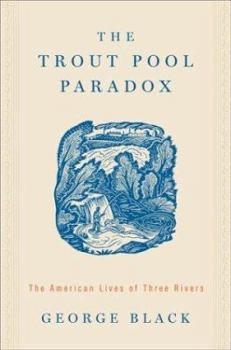The Trout Pool Paradox: The American Lives of Three Rivers
The very rivers that make the best trout streams - fast, cold, and clear - also gave birth to the American industrial revolution. Nowhere has this been more true than in an area not far from New York... This description may be from another edition of this product.
Format:Hardcover
Language:English
ISBN:0618310800
ISBN13:9780618310807
Release Date:January 2004
Publisher:Houghton Mifflin
Length:327 Pages
Weight:3.10 lbs.
Dimensions:1.1" x 6.3" x 9.2"
Customer Reviews
2 ratings
Thought as Deep as Rivers
Published by Thriftbooks.com User , 15 years ago
First let's get one thing straight- Black is a superb writer who understants his subject. He has served as a writer and an editor for several environmental publications. In Trout Pool Paradox He follows the histories of three very similar Conncticut rivers each with different history and a different fate; one seriously degraded, one modified beyond recognition,and another(still a trout stream) but heavily effected by human activities. He digs into the social, political and historical forces that made them different. As a previous reviewer said, he wants to give his readers a perspective on how we relate to our natural environment. Black higlights some of the conflicts and contrdictions that arrise when we try to restore someting that has been lost forever. He wants the reader to realize a key paradox of environmentalism--that as much as we may want to live in a natural environment, our very living there changes it. Black does a marvelous job of describing both the historical and contemporary figures who have affected the rivers. Everyone, he finds, has a different take on the current conditions of the three streams and have different but reasonable views about what needs to be done. They all have different solutions to the Trout Pool Paradox. The book is fascinating, beautifully written, and thought provoking. A must read for anyone who loves free flowing rivers -Doug
Not just for fishermen
Published by Thriftbooks.com User , 18 years ago
Despite the title (trout pools are sections of brooks where cool water collects and serve as feeding grounds for trout), author George Black has said "this really isn't intended to be a fishing book..." The three Connecticut rivers he looks at--the Naugatuck, the Shepaug, and the Housatonic--have experienced entirely different fates, despite their proximity and generally similar environments. The Naugatuck became an industrialized river, a convenient waste stream for Waterbury's brass factories and other industrial plants along its length. The Shepaug, tapped to feed the city of Waterbury's lust for water, became a flow-impaired shadow of its former self, except for a few months in the spring. The Housatonic, despite damming for hydroelectric purposes, was able to remain a prime trout-fishing and recreational river (despite being polluted with PCBs). Providing a meandering tracing of the history of these rivers, Black deals with deeper concepts, such as the difference between restoring and preserving a natural environment, man's attempts to create areas that match our vision of 'nature' (by stocking rivers with non-native trout species, for example), and our very understanding of nature. We tend to stand back and picture nature as something that is obvious and given and apart from us, and yet man must live by exploiting and sometimes altering natural resources, and the pristine natural environments we imagine are archaic and probably unattainable. Interestingly enough, just in the spring of 2005 (after publication of this book), a court settlement was reached which will largely restore the flow of the Shepaug. Black discusses this lawsuit and foresaw the parties reaching a settlement of the matter rather than continuing litigation.





